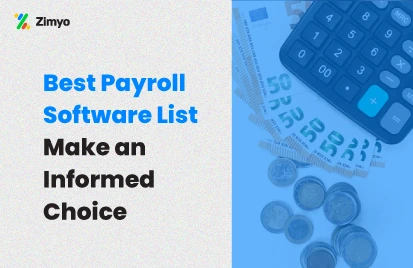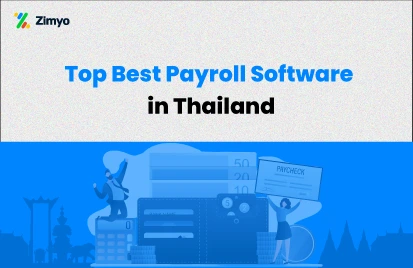Expense management
Expense management is an essential aspect of payroll management. It is the process of tracking, controlling, and monitoring employee expenses related to business travel, entertainment, and other reimbursable expenses. Expense management plays a critical role in maintaining the financial health of an organization. This blog will discuss the importance and benefits of expense management in payroll.
The expense management software helps you to gain insights into your business’s spending patterns and identify areas for cost-cutting with robust expense reporting and analytics. Generate expense reports to track spending across departments, categories, and periods. Use analytics tools to analyze spending trends, identify outliers and potential policy violations, and make data-driven decisions. With the proper reporting and analytics tools, you can optimize your expense management process, reduce costs, and improve overall financial performance.

Importance of expense management
1. Reducing costs
Expense management helps to reduce costs by identifying unnecessary expenses and reducing fraudulent claims. By having a clear and concise expense policy, employees are aware of what expenses are reimbursable and what is not. This helps to reduce the number of claims submitted for non-reimbursable expenses.
2. Improved financial control
Expense management helps organizations to have better control over their finances. By implementing expense policies and procedures, organizations can ensure that expenses are within budget and in compliance with the organization’s financial policies.
3. Streamlining the reimbursement process
Expense management helps to streamline the reimbursement process by automating the process of submitting, approving, and reimbursing employee expenses. This saves time and reduces the administrative burden on the organization.
4. Increased compliance
Expense management ensures that employees comply with the organization’s financial policies and regulations. By having clear policies and procedures in place, employees are aware of what expenses are reimbursable and what is not. This helps to reduce the risk of non-compliance and fraud.
Manage Your Expense!
Benefits of Expense Management in Payroll
1. Time savings
Expense management saves time by automating the reimbursement process. Employees can submit their expenses online using an expense management system, and managers can approve or reject them in real-time. This reduces the time spent on paperwork and administrative tasks.
2. Improved visibility
Expense management provides organizations with better visibility into their expenses. Organizations can identify areas to reduce costs and optimize their spending by tracking and monitoring employee expenses.
3. Reduced fraud
Expense management helps to reduce fraudulent claims by implementing policies and procedures that prevent employees from submitting false or inflated claims. This reduces the risk of financial losses due to fraudulent activities.
4. Improved accuracy
Expense management ensures that expenses are accurately recorded, approved, and reimbursed. This reduces the risk of errors and discrepancies in the financial records of the organization.
5. Increased employee satisfaction
Expense management helps to increase employee satisfaction by ensuring that employees are reimbursed for legitimate business expenses. By having clear policies and procedures in place, employees are aware of what expenses are reimbursable and what is not. This reduces the risk of disputes and increases employee satisfaction.
Challenges in expense management
Expense management of payroll can be a complex process, and there are a number of challenges that organizations may face in managing these expenses. Some of the common challenges in expense management of payroll include:

1. Compliance
Compliance with various labor laws and regulations is a significant challenge in payroll expense management. This includes ensuring that all employees are being paid fairly and that payroll taxes are being calculated and paid correctly.
2. Data accuracy
Another challenge in expense management of payroll is ensuring that all data is accurate and up-to-date. This includes data related to employee hours, pay rates, and benefits, as well as tax and regulatory requirements.
3. Manual processes
Many organizations still rely on manual processes for payroll expense management, which can be time-consuming and error-prone. This can lead to delays in payroll processing and increase the risk of errors and compliance issues.
4. Technology
Technology can be both a challenge and an opportunity in payroll expense management. While technology can help automate many processes and improve data accuracy, it can also be expensive to implement and maintain.
5. Employee engagement
Engaging employees in the expense management process can be a challenge, particularly if employees are not familiar with the process or if they do not see the value in it. This can lead to delays in processing expenses and increase the risk of errors and compliance issues.
Overall, effective expense management of payroll requires a combination of technology, process improvement, and employee engagement. By addressing these challenges head-on, organizations can streamline their payroll processes, improve accuracy and compliance, and ultimately save time and money.
# How Zimyo can benefit your organization?
Zimyo streamlines your expense management process by integrating it with your payroll system. Automate expense reimbursements, eliminate manual data entry errors and ensure accurate and timely payments. Save time and effort by integrating expense management with payroll, and improve overall efficiency and accuracy.
1. Expenses categorization
Improve your expense monitoring accuracy by 80% by categorizing your expenses. Divide expenses into different categories, analyze each category’s spending, allocate a budget for each category, and handle expenses more efficiently.
2. Expense tracking
Keep track of all your expenses in one place. Get notified about employees’ expense requests and set up a workflow to approve or deny expense claims. Check expense details, settle pending claims, and configure expense workflows.
3. On-Field employee expenses
Ensure fair and accurate reimbursement of on-field employees’ expenses. Monitor their mileage by tracking their trip’s start and end points and attendance punches, avoid fraudulent expense tracking, and ensure transparent expense tracking with GPS and mobile tracking.
4. Expense policies
Prevent overspending by creating your own expense policies for every expense category. Set spending limits for each designation to avoid overspending and allocate expense budgets to every department. Configure custom policies and create expense spending policies.
5. Petty cash management
Manage small to large miscellaneous business expenditures with ease. Real-time monitor petty cash expenses, manage miscellaneous expenses, and set up a configurable workflow for petty cash management to keep track of spending and cut down unnecessary expenses by 95%.
Improve Expense Management
In conclusion
Expense management is an essential aspect of payroll software. It helps organizations to reduce costs, improve financial control, streamline the reimbursement process, and increase compliance. By implementing an expense management system, organizations can save time, improve visibility, reduce fraud, improve accuracy, and increase employee satisfaction. Therefore, it is crucial for organizations to have clear policies and procedures in place for expense management and to ensure that employees are aware of what expenses are reimbursable and what is not.




